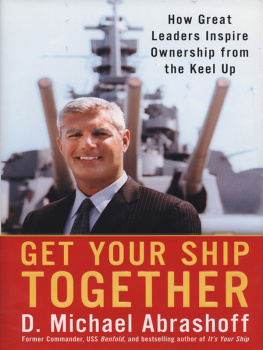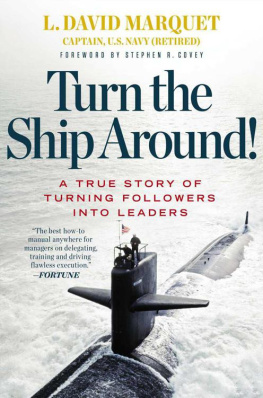Copyright 2008 by D. Michael Abrashoff
All rights reserved. Except as permitted under the U.S. Copyright Act of 1976, no part of this publication may be reproduced, distributed, or transmitted in any form or by any means, or stored in a database or retrieval system, without the prior written permission of the publisher.
Business Plus
Hachette Book Group
237 Park Avenue
New York, NY 10017
Visit our Web site at www.HachetteBookGroup.com.
First eBook Edition: May 2008
ISBN: 978-044-653706-3
Its Your Ship
Get Your Ship Together
To our men and women in uniform, who are serving to protect our freedom.
Satchel Paige, the legendary major league pitcher, was famous for cautionary maxims. He urged people to shun running at all times, to go very light on the vices, and to avoid fried meats, which angry up the blood. And everyone smiles at this tip: Dont look back. Something might be gaining on you. But Satchel had it slightly wrong. Ive found that the more I look back, the smarter I am about the present. And that, in a nutshell, is what this book is about: the unimagined lessons Ive been privileged to learn in the six years since I wrote my first book, Its Your Ship.
That book described how my crew and I turned a high-tech but dysfunctional guided-missile destroyer, USS Benfold, into the best damn ship in the Navy. The book became a best-seller on the business lists, and when I left the service in 2001, it launched me into a new career on the lecture circuit. I spend most of my time speaking to business leaders, helping them apply my Benfold experience to the challenges they face today. I now make about a hundred speeches a year.
I am writing again because it turns out that Its Your Ship was only a beginning. And now Ive found my own Satchel-ism: The past is gaining on me and shedding new light on the present.
I was a relatively young man when I left the Navy, just forty, and my education was a work in progress. It still is. The leaders I speak to have much to say in return, and I listen and learn. I also spend time thinking about my Navy experience, comparing it to the real-life conditions my audiences meet head-on every day. Ive made a point of staying in touch with many of the 310 men and women who served with me on Benfold, and their memories have become a new source of learning for me. As a result, my message has changed somewhat.
The biggest shift is reflected in the one-letter difference between the title of this book and the title of my first one: I now know that it has to be our ship, not your ship. As a young commanding officer fighting to make my mark in the Navy, I was a bit too self-centered. Determined to go beyond standard performance and make my ship outstanding, I understood that the only way I could do that was by enlisting the whole crew in the cause. I had to make them take ownership of the ship and its mission, and persuade them to cooperate and work together rather than compete with one another in watertight compartments. I tried to put myself in the shoes of both my crew members and my customer, the battle group commander, and I strove to anticipate the commanders needs before he even knew he had them.
My approach worked, and together we made Benfold the go-to ship in the Pacific Fleet, the first ship the admiral thought of when he had a tough assignment. We were the star ship, winning the prestigious Spokane Trophy in 1997 as the most combat-ready ship in the whole Pacific Fleet. But my big mistake was never putting myself in the shoes of my peers, my fellow captains. Had I done so, I would have recognized Benfold as a ship that had become a little too cocky and arrogant amid all the praise. The other captains werent hoping, as I imagined they were, to make their ships match Benfold; some of them hoped we would run aground.
I figured out that my own people had to work together as a team to improve the ship, but I failed to take that insight to the next level, where I would have seen Benfold as one ship in a ten-ship battle group. Because of my shortsightedness, I never did one thing to help another ship in the group in the two years I spent as Benfolds commander. In fact, I took a great deal of pleasure whenever we bested the performance of any of our group mates. In hindsight, I readily admit that my sights were locked on my own ambition, to the detriment of the larger mission. I wasnt mature enough or smart enough to recognize that if one of the other ships in the group fell down on the job and caused the aircraft carrier to sink, the whole battle group would fail. In that event, it wouldnt matter that Benfold was the best ship.
So, with the benefit of time and my exposure to the experiences of others, I now have a revised message: I would now say to every man and woman aboard, Its not your ship; its our ship. Its a vessel that belongs to and depends on every member of the crew, and it is also part of a fleet of ships with a larger mission that the whole crew must own. Thanks to the thousands of men and women who have made up my audiences these past seven years, I have come to understand that my principles and techniques can succeed to their fullest extent only if all involved take ownership for the wider mission. Ive had to rethink some of those principles and techniques, and Ive come across some new ones that I never imagined in the Benfold days.
In the chapters ahead, Ive set a course that I believe will help any leader and his or her crew make the voyage from great dreams to great success. Along the route are benchmarks that must be met to ensure progress. Each chapter describes key skills of a good leader and distills those skills into a set of lessons that bring together what Ive learned from life and other leaders.
Heres a quick preview of the chapter topics along with a summary of the main points:
Getting people started off on the right foot and keeping them striding confidently forward is crucial to any successful venture. Frosty welcomes make new crew members unnecessarily wary of the jobs they should be eager to begin. And their trepidation is likely to slow the mission itself. Chapter 1 shows leaders how to attract the right kind of people, how to bring them aboard in a warm and welcoming fashion, and how to keep them happy and eager to come to work every day.
Excellence has always defined winning organizations. But even perfectly nice, basically competent people may be stumped as to what your company means by excellence and how they must achieve it. Chapter 2 suggests ways you can show your crew members what excellence on the job is all about, and then inspire them to reach for the stars themselves. You can vastly speed your efforts by sharing responsibility for decision making, building confidence through training, instilling respect for even the lowliest job, and giving everyone a stake in the organizations success. The sooner you make it our ship, the sooner you and your crew will be cruising at flank speed.
Truth-tellers may be applauded in theory, but when a bad-news bearer shows up in real life, far too many leaders shoot first and ask questions later (if they ask at all). Lets face it, some harried executives prefer aye-aye men and women, even when its in their best interest to hear the worst. But leaders have enormous incentive to encourage truth-telling. Chapter 3 shows how: Applaud candor even when it hurts; keep your preferences to yourself to prevent suck-ups from parroting them back to you; set an example for your crew by publicly delivering bad news to a superior without delay; and privately challenge questionable decisions from on high (diplomatically, of course).










